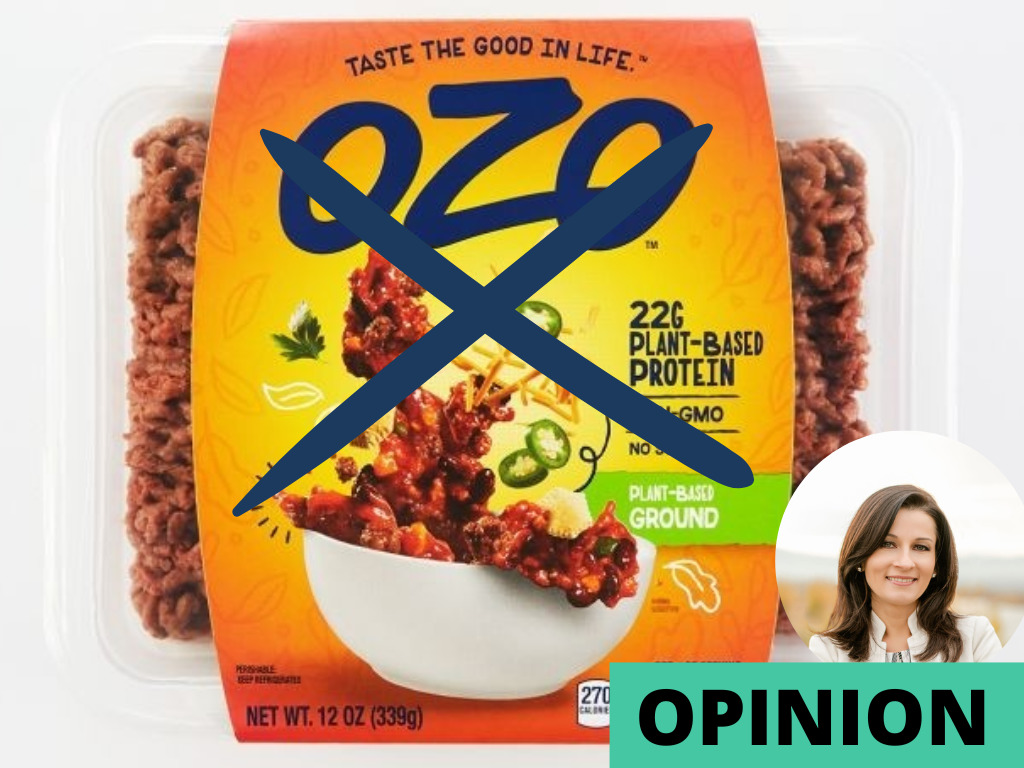The World’s Largest Beef Company Is Breaking Up With Plant-Based Meat. Is It The End of The Category, Or Something Else Entirely?
4 Mins Read
Notes From the Frontlines of the Sustainable Food Movement – a new opinion column by Irina Gerry
The world’s largest meat company, JBS, has exited its plant-based business in the US. Is this a bad sign for plant-based meat?
On Saturday, news broke out that JBS was axing its U.S. plant-based business, Planterra Foods, maker of OZO brand, just two years after launch. On one hand, the news of Planterra’s demise fits the prevailing media narrative of plant-based meat underperforming versus expectations, on the other, should we be surprised?
JBS is the world’s largest producer of beef and lamb – the leading sources of agricultural greenhouse gas emissions– so clearly, it has a sustainability problem on its hands. In fact, this announcement came just days after JBS appointed its first Chief Sustainability Officer, and announced two new retail partnerships for OZO with Gregory’s Coffee and Veggie Grill across the United States. The move to exit its plant-based business is a sign that the company is less interested in actively tackling the massive livestock climate impact issue at hand than many of us had hoped. Given that JBS made a Net Zero 2040 commitment and signed a partnership with DSM at COP26 to reduce methane emissions from livestock, it may also be a sign that Big Beef is learning from Big Oil’s greenwashing tactics.
As I’ve written before, there is no such thing as low-carbon beef. It is physically impossible to rid livestock production of emissions. The much-hyped seaweed additives, while showing promising emission reduction potential to reduce methane emissions when added to cow feed on feedlots, are not logistically possible to implement at pasture, which is where grazed beef cattle spend the majority of their lives. Further, they do not help with emissions associated with producing feed crops like soy, corn and alfalfa hay, or all the processing and shipping operations, nor do they abate emissions from manure.
When evaluated holistically, even assuming this could be scaled, which is a massive “IF”, seaweed additives appear to only provide a modest 9 percent reduction in livestock emissions. Far from the panacea they are portrayed to be, and looking more like a “clean coal” strategy from the fossil fuel playbook. JBS operations are estimated to produce around half of the comparable fossil fuel emissions of giants such as ExxonMobil, Royal Dutch Shell, or BP, so there is no surprise to see some borrowed tactics. Livestock production will continue to be a massive source of methane emissions and they know it. In fact, the meat industry is actively lobbying the US government to exclude agriculture from emissions regulations.
Despite the ambitious-sounding zero-deforestation commitment, in January this year, Bloomberg published a searing indictment of JBS’s deforestation and beef-washing practices in the Amazon, putting the blame for ongoing deforestation in Brazil on JBS. Livestock production continues to be the leading cause of tropical deforestation today. Given JBS’s reputation for corruption and other misleading practices, should we trust the company now? It’s worth noting that the company doesn’t fare much better from a social perspective either. During Covid, JBS was embroiled in several employee mistreatment scandals and worker health and safety violations while posting record profits.
Given the scientific evidence that we must drastically reduce global meat consumption to avoid a climate breakdown, my hope was to see a genuine shift toward promoting plant-based meat alternatives alongside a concerted effort to reduce global meat production. However, it appears that the motivation was largely driven by the strong market momentum of plant-based meat in 2019 and the perceived incremental revenue growth opportunity. But when the going got tough and hockey stick revenue growth didn’t materialize, JBS was quick to jump ship. Planterra’s shutting down is a good reminder to not be so quick to buy into the idea that Big Business sees the climate crisis the same way we in the sustainable food movement do.
Instead, JBS is doubling down on the base business, just like ExxonMobil did on fossil fuels, except with a more friendly, polished tone. Cue all manner of new Chiefs of Sustainability appointments, PR campaigns about partnerships, sustainability commitments, and even some token investments, like the Greener Cattle Initiative, spending $5 million dollars over the next 5 years. Keep in mind, JBS posted $71 billion dollars in annual revenue in the last earnings report ending June 30th, 2022.
Behind the scenes, we may see a continued drive to grow the meat business and deploying a variety of tactics to greenwash the beef industry by hijacking the regenerative agriculture movement, getting millions in government handouts from the “climate-smart” agriculture programs, promoting beef consumption through countless industry organizations, and of course, doing everything they can to stave off any threats from market disruptions like plant-based or cultivated meat by running covert PR campaigns through organizations like Center for Consumer Freedom, which pushes the “ultra-processed fake meat” narrative, alongside stoking the “woke” meat culture wars. Disclaimer: While I do not have confirmation that JBS was funding this particular campaign, this type of activity is quite commonplace among the largest industry players.
I wish we could find a way to get the largest meat companies to genuinely embrace the sustainable food system transformation. I wish we could get them to deploy their massive market power and actually create demand for plant-based meat alternatives while welcoming the global shift to plant-centric diets. For a while, it looked like maybe Planterra Foods would be the face of such transformation and I am sad to see it go. I wish we could deploy the power of JBS to create new sustainable business models that help us keep a livable planet, because making plant-based meat a success story is not a matter of opinion or business opportunity, it is a matter of survival.
Lead image designed by Green Queen Media with image courtesy of Planterra Foods.




